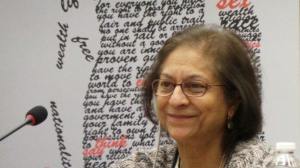Syeda Hameed in The Citizen:
Phaili hain fizaon mein iss tarah teri yaadein
Jis simt nazar unthi awaaz teri aaiyee
Sau baar chaman mehka sau baar bahaar aiyee
Duniya ki wohi raunaq dil ki wohi tanhai
 You lit up my life as you did the life of thousands like me. Dear friend and mentor Asma Jahangir who would have thought I was seeing you for the last time on November 28 2017, the date is etched on my heart.
You lit up my life as you did the life of thousands like me. Dear friend and mentor Asma Jahangir who would have thought I was seeing you for the last time on November 28 2017, the date is etched on my heart.
On reaching Lahore I wrote to you. You had just returned from Islamabad after a difficult day. But your home and hospitality was ready to welcome me. It was an unforgettable evening around your splendid table with family, friends, bonhomie. Then I heard from you the saddest words I had ever heard you speak. We were talking about the total embargo on visas. Friends from Pakistan were longing to come to India; there were family weddings, there was Jashn e Rekhta, personal bereavements. But visa doors had been slammed on the faces of all applicants. With exception though. I said to you, 'Why don't you come, you are the only one in Pakistan who still has a multiple entry visa'. Then came your heart wrenching words. 'It's not about me. It's about all of us here on this side of the border. Ab dil nahin chahta...we feel unwanted by a country we have stood by consistently for a quarter century despite every possible deterrent'.
Today her janaza procession will be led by her indomitable sister Hina Jilani and carried on the shoulders of women of WAF (Womens Action Forum) which she helped found in the 1970's. But none of us from this side will be there. It would have been so simple for dozens of us to have driven our vehicles for 6 hours. It is only 300 miles from Delhi to Lahore. We who have been choking back our tears ever since the news broke will be denied her last deedar.
We will sit in Delhi and recall the year 2000 when at the height of Kargil she brought to Delhi 72 women in two buses under the banner of WIPSA (Womens Initiative for Peace in South Asia). When the buses pulled into Ambedkar Bus Depot, many of us were there with flowers. The first one to disembark was a small slightly built woman, holding in her hands two white pigeons. The hands opened, the pigeons fluttered away in the Indian skies. That was Asma Jahangir.
The same woman who was the first to welcome a bus load of Indian women who had gone to Lahore on Bus of Peace led by Nirmala Deshapande and Mohini Giri. She came to receive us at Lahore's Faletti's Hotel with bangles and dupattas for each musafir, breaking both stereotypes, in this one Asma-stroke, both became symbols of power.
More here.
